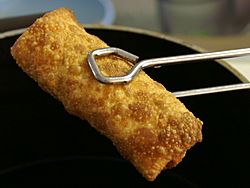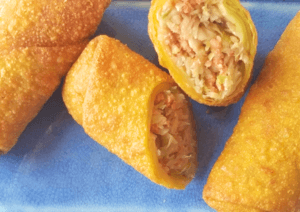Egg roll facts for kids

Freshly fried egg roll with rough, bubbly outer skin
|
|
| Type | Chinese-American cuisine |
|---|---|
| Course | Hors d'oeuvre or side dish |
| Place of origin | United States |
| Created by | Undetermined. General belief is in New York City in the 1930s. Henry Low included an egg roll recipe in his 1938 book Cook at Home in Chinese. |
| Main ingredients | Wheat pastry skin, cabbage, pork |
| Egg roll | |||||||||||||||
|---|---|---|---|---|---|---|---|---|---|---|---|---|---|---|---|
| Chinese | 蛋卷 | ||||||||||||||
| Literal meaning | "egg roll" | ||||||||||||||
|
|||||||||||||||
Egg rolls are a popular deep-fried snack or appetizer often found in American Chinese restaurants. Imagine a tasty, savory roll with a crispy outside!
An egg roll is usually shaped like a cylinder. It has shredded cabbage, chopped pork, and other yummy fillings inside. This filling is wrapped in a thick wheat flour skin. Then, it's fried until it's golden and crispy.
You usually eat egg rolls warm, often with your fingers. People like to dip them in different sauces. Some popular choices are duck sauce, soy sauce, plum sauce, or hot mustard. Egg rolls are a very common part of American Chinese meals. They are often served with fried rice and fortune cookies.
Where Did Egg Rolls Come From?
The exact start of the egg roll is a bit of a mystery! We don't know for sure who invented them or where. Egg rolls are similar to spring rolls from mainland China, but they are not exactly the same.
People first started seeing egg rolls in the United States in the early 1900s. An old recipe from 1917 mentioned egg rolls. However, that recipe was for something different. It described meat and vegetables wrapped in an egg omelette, then fried and sliced. This was more like a Japanese dish called Tamagoyaki or a Korean dish called Gyeran-mari.
Many people believe the modern American egg roll was created in New York City. This happened in the early 1930s. Two chefs, Lung Fong and Henry Low, both said they invented it. Henry Low even put an egg roll recipe in his 1938 cookbook. His recipe included ingredients like bamboo shoots, roast pork, shrimp, and scallions. Interestingly, his recipe did not have much cabbage, which is a main ingredient today!
You might wonder why they are called "egg rolls" if they don't usually have egg inside. The outer wrapper might or might not contain egg. The real reason for the name is still unclear. Some people thought the Chinese word for "egg" sounded like the word for "spring." However, this idea isn't widely accepted. The main flavor in American egg rolls is usually cabbage, not eggs.
Egg Rolls vs. Spring Rolls
There are many kinds of rolls in East Asia. You can find different types of spring rolls in Chinese, Thai, and Vietnamese restaurants. However, American egg rolls are special and easy to tell apart.
A typical "New York-style" egg roll is about two inches wide and six inches long. It has a thick, chewy, and bumpy outer skin that gets very crispy when fried. American egg rolls, like other Americanized Chinese foods, might use vegetables or flavors not common in China. For example, some might even have broccoli!
Sometimes, restaurants offer both egg rolls and spring rolls on their menu.
- Some spring rolls are served cold. They have a fresh filling wrapped in thin rice paper. This is common in Vietnamese restaurants.
- Other spring rolls are fried, like in some Thai and Chinese places. When fried, these spring rolls are usually smaller and have a lighter, crispier skin. This skin is made from thinner sheets of wheat or rice dough.
See also
 In Spanish: Rollo de huevo para niños
In Spanish: Rollo de huevo para niños
 | Stephanie Wilson |
 | Charles Bolden |
 | Ronald McNair |
 | Frederick D. Gregory |


